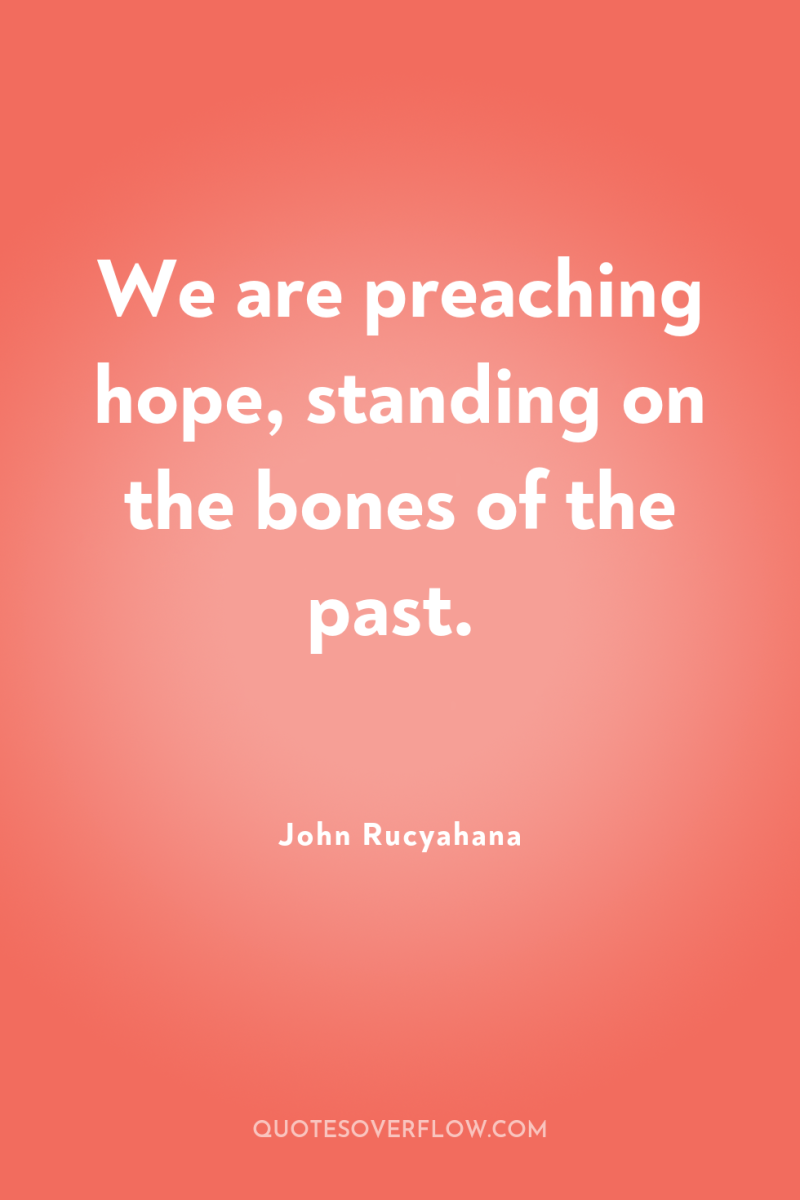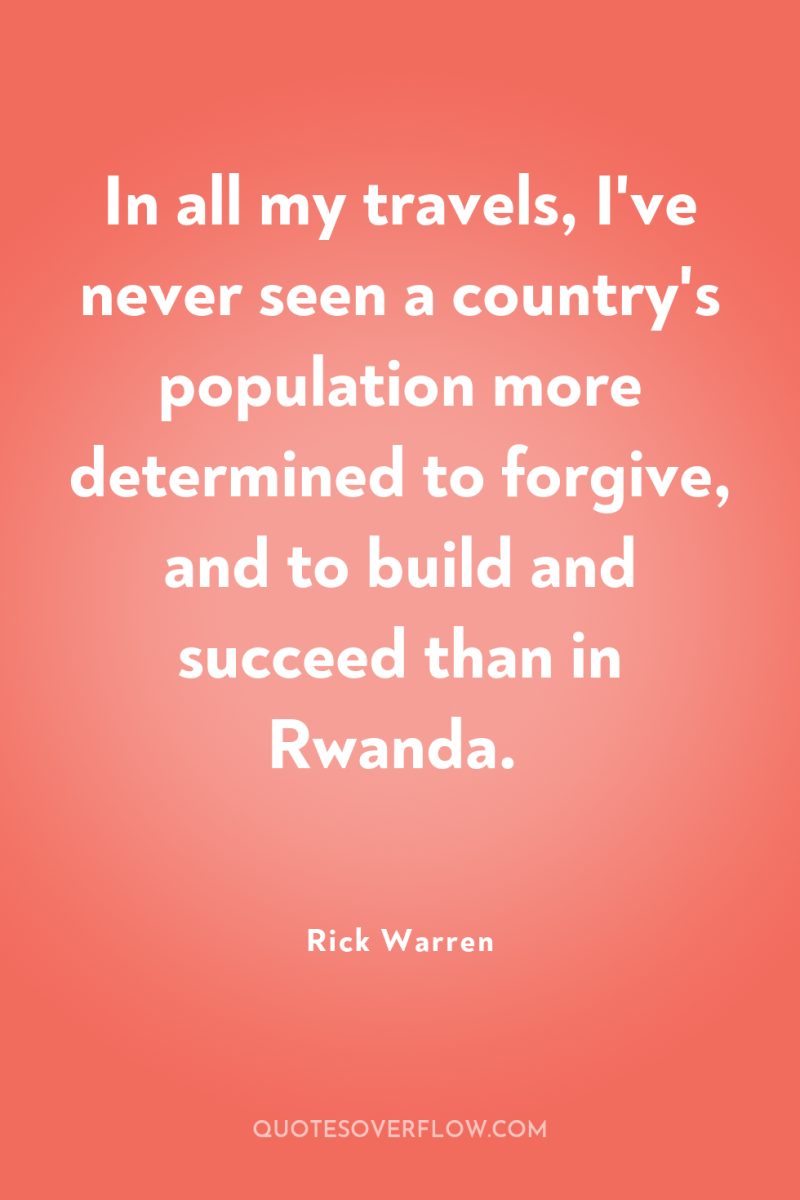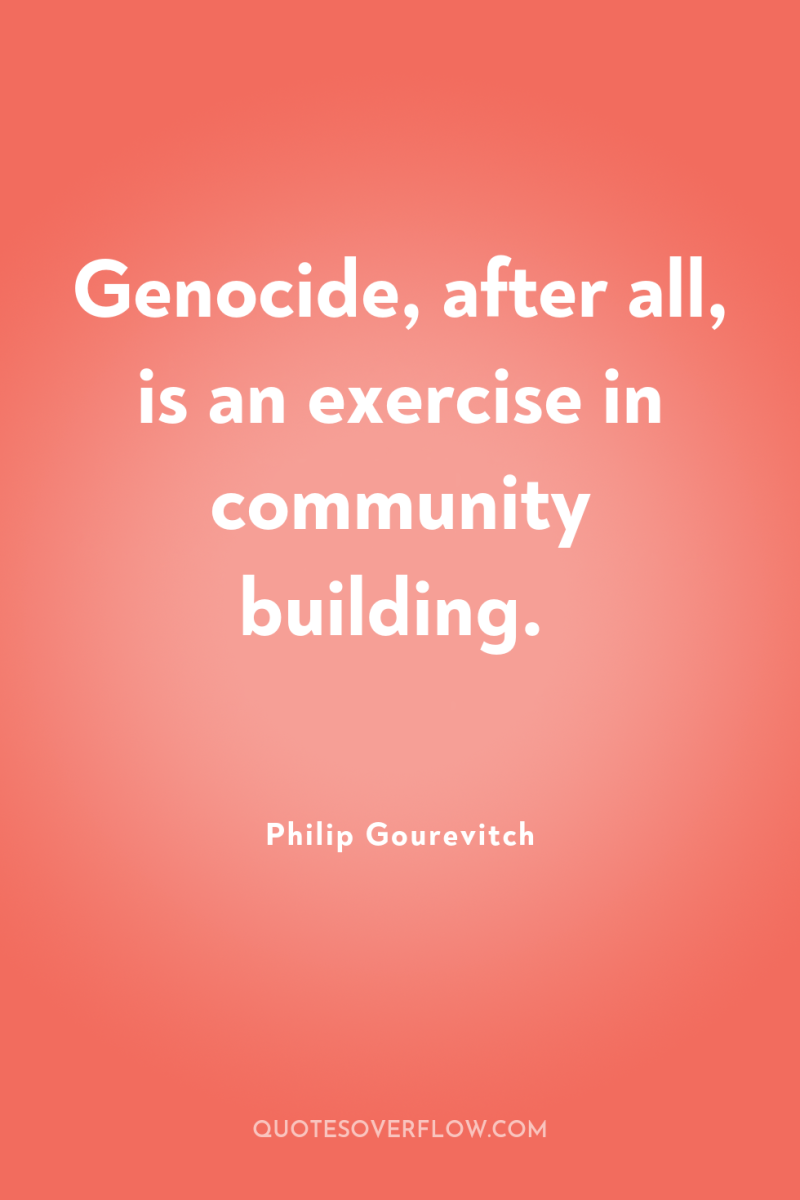
1
In Rwanda, one person's God is another person's Satan-Thérèse NyirabayovuKarl Maier
2
What I learned in Rwanda was that God is not absent when great evil is unleashed. Whether that evil is man-made or helped along by darker forces, God is right there, saving those who respond to His urgings and trying to heal the rest.James Riordan

3
We are preaching hope, standing on the bones of the past.John Rucyahana
4
..The typhoon of madness that swept through the country [of Rwanda] between April 7 and the third week of May accounted for 80 percent of the victims of the genocide. That means about eight hundred thousand people were murdered during those six weeks, making the daily killing rate at least five times that of the Nazi death camps. The simple peasants of Rwanda, with their machetes, clubs, and sticks with nails, had killed at a faster rate than the Nazi death machine with its gas chambers, mass ovens, and firing squads. In my opinion, the killing frenzy of the Rwandan genocide shared a vital common thread with the technological efficiency of the Nazi genocide--satanic hate in abundance was at the core of both. .John Rucyahana

5
In all my travels, I've never seen a country's population more determined to forgive, and to build and succeed than in Rwanda.Rick Warren

6
Genocide, after all, is an exercise in community building.Philip Gourevitch
7
(On the beginning of the mid-1990s' genocidal war in Rwanda:)Within six weeks, an estimated 800, 000 Tutsi, representing about three-quarters of the Tutsi then remaining in Rwanda, or 11% of Rwanda's total population, had been killed.Jared Diamond
8
I knew that to really minister to Rwanda's needs meant working toward reconciliation in the prisons, in the churches, and in the cities and villages throughout the country. It meant feeding the hungry, sheltering the homeless, caring for the young, but it also meant healing the wounded and forgiving the unforgivable. I knew I had to be committed to preaching a transforming message to the people of Rwanda. Jesus did not die for people to be religious. He died so that we might believe in Him and be transformed. I'm engaged in a purpose and strategy that Jesus came to Earth for. My life is set for that divine purpose in Jesus Christ. I was called to that--proclaiming the message of transformation through Jesus Christ.John Rucyahana
9
Rwanda will never ever leave me. It's in the pores of my body. My soul is in those hills, my spirit is with the spirits of all those people who were slaughtered and killed that I know of, and many that I didn't know. … Fifty to sixty thousand people walking in the rain and the mud to escape being killed, and seeing a person there beside the road dying. We saw lots of them dying. And lots of those eyes still haunt me, angry eyes or innocent eyes, no laughing eyes. But the worst eyes that haunt me are the eyes of those people who were totally bewildered. They're looking at me with my blue beret and they're saying, "What in the hell happened? We were moving towards peace. You were there as the guarantor" -- their interpretation -- "of the mandate. How come I'm dying here?" Those eyes dominated and they're absolutely right. How come I failed? How come my mission failed? How come as the commander who has the total responsibility-- We learn that, it's ingrained in us, because when we take responsibility it means the responsibility of life and death, of humans that we love.Unknown
10
George Bush made a mistake when he referred to the Saddam Hussein regime as 'evil.' Every liberal and leftist knows how to titter at such black-and-white moral absolutism. What the president should have done, in the unlikely event that he wanted the support of America's peace-mongers, was to describe a confrontation with Saddam as the 'lesser evil.' This is a term the Left can appreciate. Indeed, 'lesser evil' is part of the essential tactical rhetoric of today's Left, and has been deployed to excuse or overlook the sins of liberal Democrats, from President Clinton's bombing of Sudan to Madeleine Albright's veto of an international rescue for Rwanda when she was U.S. ambassador to the United Nations. Among those longing for nuance, moral relativism–the willingness to use the term evil, when combined with a willingness to make accommodations with it–is the smart thing: so much more sophisticated than 'cowboy' language.Christopher Hitchens
11
The West's post- Holocaust pledge that genocide would never again be tolerated proved to be hollow, and for all the fine sentiments inspired by the memory of Auschwitz, the problem remains that denouncing evil is a far cry from doing good.Philip Gourevitch
12
It always amazes me how people in Europe and the United States can be so indifferent to the speeches of their chancellor or president, for these worlds from the top can be a wind sock for what might happen next.Paul Rusesabagina
13
Rwanda’s Muslim community is an example of a group (a full community rather than isolated individuals) that resisted the appeal of dangerous speech and other pressures to participate in the genocide. The Muslim community, which had both Hutu and Tutsi members, not only refused to participate in the genocide but actively opposed it. Its actions during the genocide included rescuing, hiding, and taking care of Muslim and non- Muslim Tutsis, and providing safe haven in mosques. Muslims also rejected commands to kill or reveal Tutsis hidden in their communities, on several occasions going so far as to fight back and be killed themselves. .Rachel Hilary Brown
14
The UN lacked the ability to act without the support of its more powerful members, notably the United States. The American government wanted to avoid a repetition of its unsuccessful intervention in Somalia, in which thirty American troops were killed. President Clinton issued a directive on UN military conditions. The operations would also have to be directly relevant to American interests. These conditions excluded American support for UN intervention to stop the genocide [in Rwanda].Jonathan Glover
15
..each bloodletting hastens the next, and as the value of human life is degraded and violence becomes tolerated, the unimaginable becomes more conceivable.Bill Clinton
16
The genocide [in Rwanda] was not a spontaneous eruption of tribal hatred, it was planned by people wanting to keep power. There was a long government-led hat campaign against the Tutsis.Jonathan Glover
17
{President] Kayibanda's government [in Rwanda] continued the persecution against the Tutsis and began to make use of the media it controlled to launch a propaganda campaign against us. In a country where more than half the people cannot read or write and very few have televisions, radio is the dominant media. The fact that some newspapers were still printing the truth didn't matter much to the part of the population that couldn't read. Most of the literate people were already politically aware. While an educated person might question what they read or hear from the media, the uneducated tend to accept it. The uneducated are more easily affected by threats and the emotional trauma that propaganda like this can create.John Rucyahana
18
Many signs point to the fact that the youth of the Third World will no longer tolerate living in circumstances that give them no hope for the future. From the young boys I met in the demobilization camps in Sierra Leone to the suicide bombers of Palestine and Chechnya, to the young terrorists who fly planes into the World Trade Center and the Pentagon, we can no longer afford to ignore them. We have to take concrete steps to remove the causes of their rage, or we have to be prepared to suffer the consequences.Unknown
19
Weber also saw that a bureaucratic world contained risks. It produced increasingly powerful and autonomous bureaucrats who could be spiritless, driven only by impersonal rules and procedures, and with little regard for the people they were expected to serve. Weber famously warned that those who allow themselves to be guided by rules will soon find that those rules have defined their identities and commitments.Michael Barnett